This post may contain affiliate links. Please read our disclosure policy.
Enjoy a crusty, fluffy, and incredibly flavorful loaf with this No Knead Skillet Bread, effortlessly filled with marinated olives and garlic. It’s simple to make and irresistibly delicious!
If you love homemade bread as much as I do, you’ve got to try my easy garlic breadsticks or these crispy, flavorful grissini, too—both perfect for dipping or snacking!
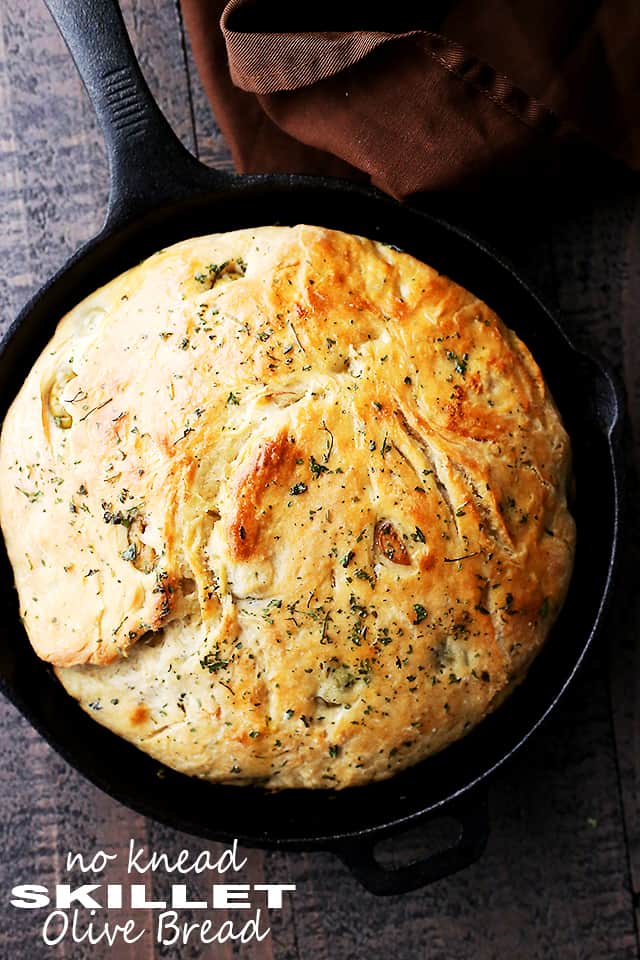
If you’re a bread lover who craves freshly baked goodness without the hassle of kneading, this No-Knead Skillet Bread is the recipe you need! This simple, flavorful homemade bread is crusty on the outside, soft on the inside, and studded with savory olives. With just a few basic ingredients and a cast-iron skillet, you can easily create a delicious loaf that will impress everyone, including yourself!
Why I Love This Skillet Bread Recipe
- Perfect Texture: Achieve a delicious texture with a soft, fluffy interior without kneading.
- Adaptable: This recipe includes marinated olives and garlic, but you can easily swap and customize it by incorporating other ingredients.
- Effortless: This bread recipe requires minimal effort, making it a perfect choice for bakers of all levels.
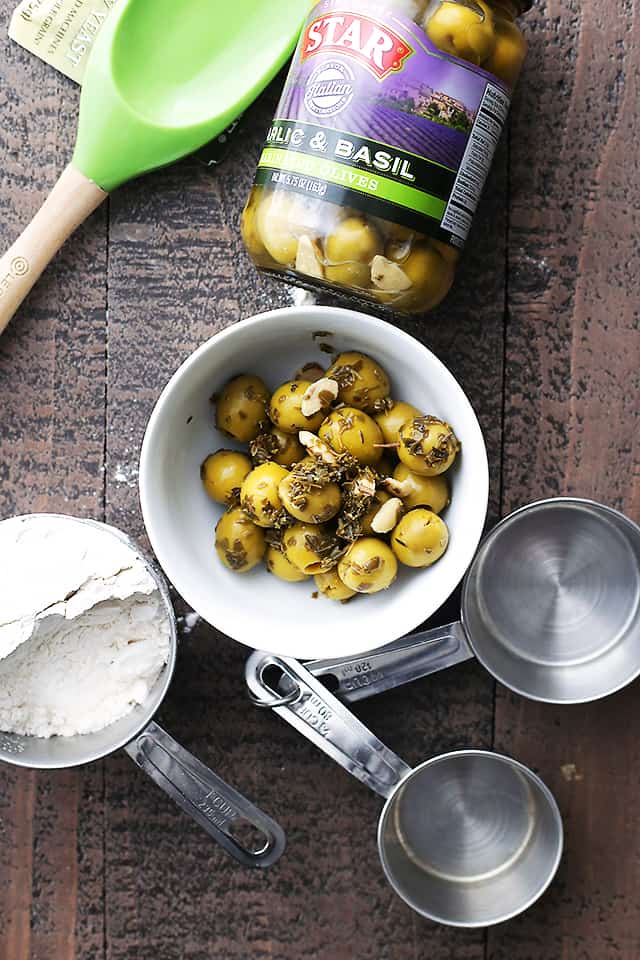
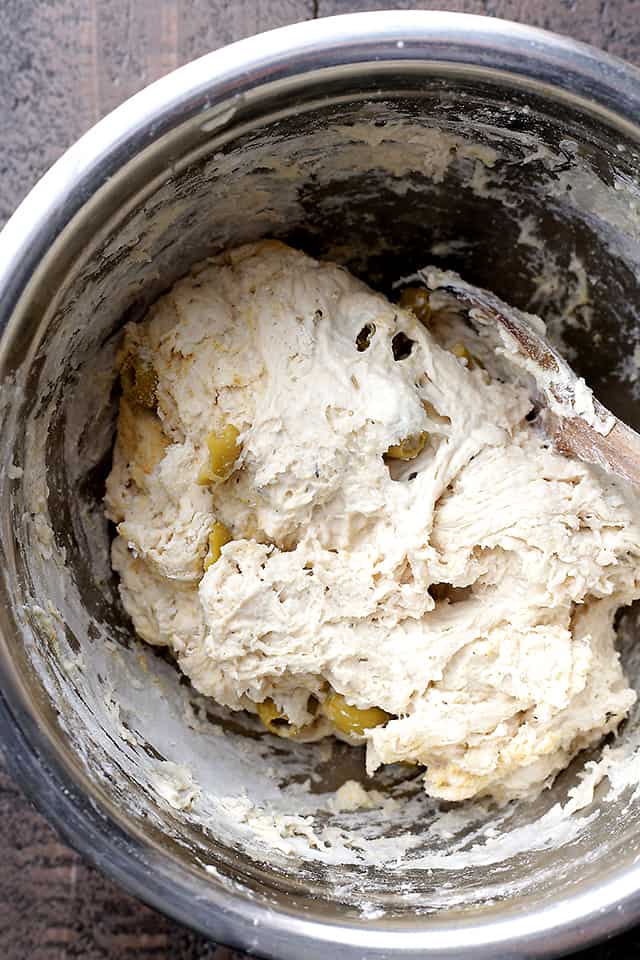
Ingredients For Skillet Bread
- For the dough: lukewarm water, yeast, all-purpose flour, and salt.
- For the filling: olives, herbs, and garlic.
How To Make No Knead Skillet Bread
As championed by the authors of Artisan Bread in Five Minutes a Day, in a nutshell, this Skillet Bread is just a batch of straightforward dough.
- Start by combining lukewarm water, yeast, flour, and salt in a bowl. Stir in the olives, herbs, and garlic and let the dough rise for 1 hour.
- Coat a 10-inch skillet (a 12-inch skillet works, too) with olive oil. Shape the dough into a disk, transfer it to the skillet, and let it rest for 30 more minutes.
- Preheat the oven to 400°F.
- Drizzle the dough with olive oil, sprinkle it with salt and parsley, and bake for 30 minutes or until browned.
- Invert the skillet bread and cool it completely on a rack before cutting and serving.
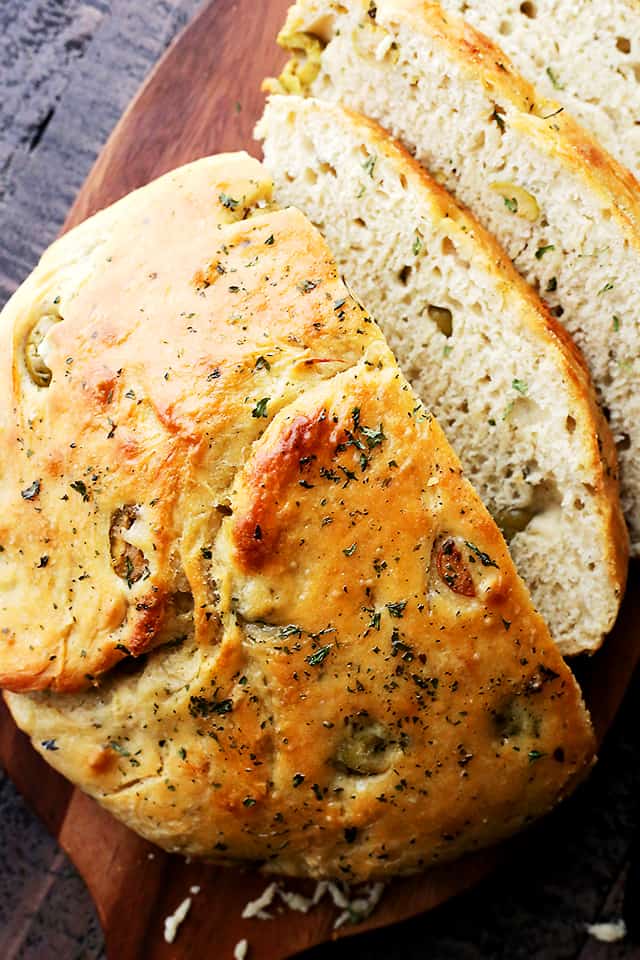
Tips For No Knead Skillet Bread
- Mixing the Dough: When combining the ingredients, the water should be warm but not hot.
- Flour: I have only tested this recipe with all-purpose flour and haven’t tried it with other types of flour.
- Resting and Rising: After mixing the dough, cover it with a clean kitchen towel or plastic wrap and let it rest in a warm spot to double in size.
- Baking Time and Temperature: Every oven is different, so keep an eye on the bread towards the end of the baking time to ensure it doesn’t overbake.
- Cooling and Serving: Once the bread is baked, transfer it to a wire rack to cool. Allow it to cool completely before slicing into it. This helps the bread retain its structure and moisture. To maintain the ideal texture of your bread, it’s crucial to remove it from the pan promptly after baking. Allowing the bread to remain in the pan can result in wet and soggy bread.
Recipe Variations
- Herbs and Seasonings: Add dried herbs like oregano, rosemary, or basil to the dough for extra flavor.
- Cheese: Mix in grated or crumbled cheese such as cheddar, Parmesan, or feta for a savory twist.
- Sun-Dried Tomatoes: Incorporate chopped sun-dried tomatoes for a tangy Mediterranean flair.
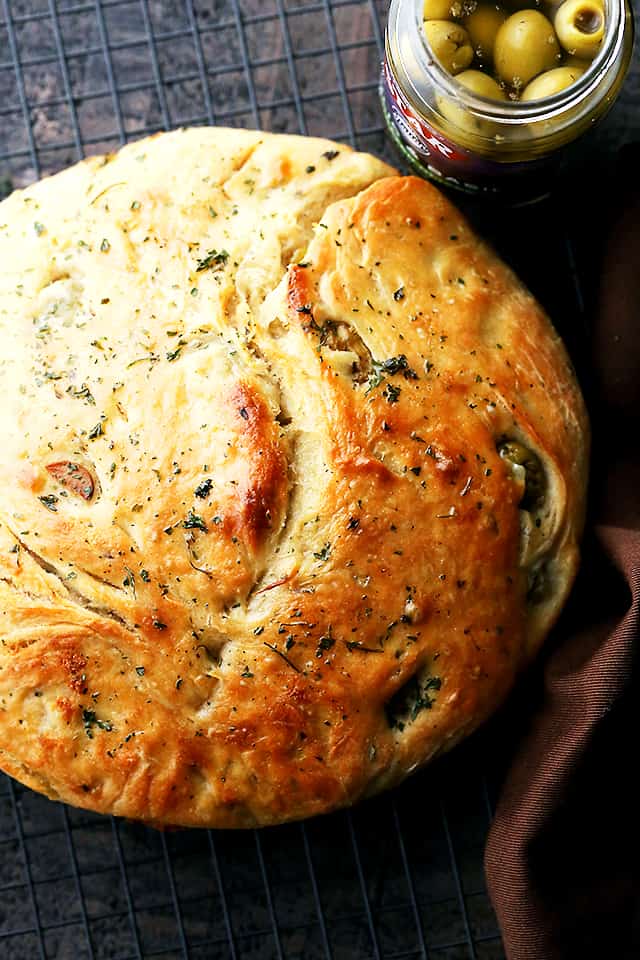
Ways to Serve It
Spread it with butter, dip it in olive oil and balsamic vinegar, sop up some tomato soup or chicken noodle soup with it, grab an heirloom tomato salad, or do what I do: break off a chunk and inhale it as is.
More Bread Recipes
Pin this now to find it later
Pin It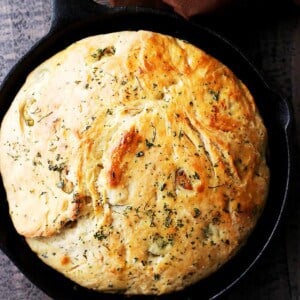
No Knead Skillet Olive Bread
Ingredients
- 2 cups lukewarm water,, about 105˚F
- 2¼ teaspoons active dry yeast
- ½ tablespoon salt
- 4⅓ cups all-purpose flour,, divided
- 1 cup garlic and basil marinated olives,, drained, herbs and garlic reserved
- 1 teaspoon garlic powder
- 2 tablespoons olive oil,, divided
- coarse salt
- dried parsley
Instructions
- In a large mixing bowl, combine water and yeast. Add 1 cup of flour and salt; stir with a wooden spoon until combined.
- Stir in the olives, herbs, garlic, and garlic powder.
- Add remaining flour, one cup at a time, stirring until thoroughly combined. Cover with plastic wrap and set in a warm spot to rise for 1 hour.
- Add a tablespoon of olive oil in a 10-inch to 12-inch cast iron skillet; using a napkin or your fingers, coat the bottom and sides of the skillet with the olive oil.
- Flour your hands; remove the plastic wrap and using your hands, transfer the dough to the prepared skillet and shape it into a disk. Cover with a kitchen towel and let stand for 30 minutes.
- Preheat oven to 400˚F.
- Drizzle remaining olive oil over the top of the bread and sprinkle with salt and parsley.
- Score the top of the loaf with a knife and bake for 30 to 35 minutes or until the top is nicely browned.
- Remove from the oven, turn the bread onto a wire rack, and let it cool completely before cutting and serving.
Video
Notes
- The olives sit in a liquid with garlic and herbs; reserve as much of the herbs and garlic as possible when draining. Alternatively, add your own garlic and freeze-dried basil to the dough.
- If you can’t find the specified olives, use whatever marinated olives you can find. Then, you can add garlic, dried basil, or other herbs.
- Dough Mixing: Use warm, not hot, water to combine the ingredients. Excessive heat can harm the yeast.
- Flour: This recipe has been tested with all-purpose flour.
- If you do not have a cast iron skillet, use a stoneware baking dish instead.
- It is crucial to remove bread from the skillet when it comes out of the oven because it will get moist and soggy if left in the skillet.
Nutrition
Nutritional info is an estimate and provided as courtesy. Values may vary according to the ingredients and tools used. Please use your preferred nutritional calculator for more detailed info.
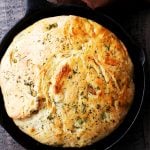








I have made this bread 4 times in the last three weeks – only 4 because I can’t stop eating it when I make it.
I took it to a July 4 garden party, where people are all about good food and they loved it.
It’s a hit, it’s easy to make and I love to bake in cast iron skillets.
You don’t have to be an experienced bread baker to make this bread and it will taste phenomenal.
Thank you so much, Tamara!! I am very glad you enjoyed it! 🙂
After the caveat about whole wheat – and I really can’t conscientiously do all white flour – I made this recipe with half whole wheat flour – a finer grind – and it worked beautifully. The only problem is – who can stop eating it? I also cut the salt to a scant one teaspoon, as I noticed the sodium was quite high. I even let the dough over-rise the second time and still it was great! Delicioso!! I’m going to try to work toward 100% whole wheat, slowly…. a half-cup more each time. The flavor is so much fuller!
Tried this tonight, was delish! I couldn’t find the olive, garlic, basil mixture so I chopped various olives but would add more seasonings next time. The bread was super easy to make and my dough was a little wet after adding the 4 cups + 1/3 cup of flour but I trusted the recipe and it was fine! The cast iron makes for such a nice crust. I will do this again and play around with adding various seasonings! Thanks!
I have made this bread several times. Easy and delicious, a total crowd pleaser. In addition to making the bread as stated, sub the olives and garlic with 1 cup of sunflower or pumpkin seeds. Watch the salt. Throw 2 teaspoons of rosemary in there, too.
Recipe says 8″ iron skillet… there’s no way. 12″ minimum.
Wow. First bread I’ve ever baked and I’m still pinching myself that it turned out exactly as described. I cooked it in a quiche pan, with no troubles. Thanks for a great recipe!
I did find that the mixture was incredibly dry after I added the last cup of flour. I added a few splashes of water until it looked like your consistency in the video. Ill be making this again, but with a tad more salt next time.
Thanks again.
I love this bread, I divided the dough and made them in my small cast iron pans then wrapped them for gifts along with my homemade canned marinara sauce and some cookies….everyone loved it!!
What kind of oil is recommended for dipping the bread into it?
I have made this twice with excellent results. The second time I did not use olives as my husband won’t eat them. I replaced the olives with a cup of Parmesan cheese and 1/4 cup of basil leaves, and kept the garlic powder measurement the same. It was delicious but without the garlic from the olives in the original, I think it would benefit from more and I will double that next time. Still, absolutely the best bread I have ever made. I used a double walled loaf pan and increased the cooking time. No one could tell it was “no knead” bread. The texture was light and fine; not dense.
I’ve made this bread now several times, I used kalamata olives and a mixture of different olives. It was delicious every time i made it! Quick and easy for a bread. When you first take it out of the pan it does feel like it isn’t cooked all the way if you cut it immediately. Let it sit for awhile out of the pan and it should be fine. I am making another batch as I write this! A keeper for sure!
Made this today, turned out great ,I did change it a bit.I used cheddar cheese and minched garlic. My whole house smelled wonderful.
Hi
I would try this recipe, but with “4-1/3 cups all-purpose flour , divided” I can´t “work”. I will need a bit wmore details. Which flour and how many (in gram) of this?
Teaspoons I can work with……..but cups? There are so many different sizes of cups noutside…
A cup is a specific unit of measurement of volume in Western cooking (Imperial measurement system). A cup is 8 fluid ounces… which is equivalent to 236.588 milliliters. Two cups is a pint, four cups is a quart, four quarts is a gallon. Teaspoon is 4.93 ml, Tablespoon is 14.79 ml. Cooking rarely measures by weight but when it does, you can use 1 Imperial ounce = 28 grams… ie. a 4 ounce steak (or a 1/4 pound burger) would be 112 grams of beef before cooking.
Actually, there are several different cup sizes, as well as differences between liquid and dry measure.
For liquid, a US cup is 240ml, an Australian one is 250ml, and a Japanese one is 200ml.
Many bakers nowadays, especially in the EU, are measuring flour, etc by weight.
Bakers very often use WEIGHT rather than volume when measuring for more consistent results. In this case, the 4 1/3 cups of flour would weigh 522 grams. Good luck!